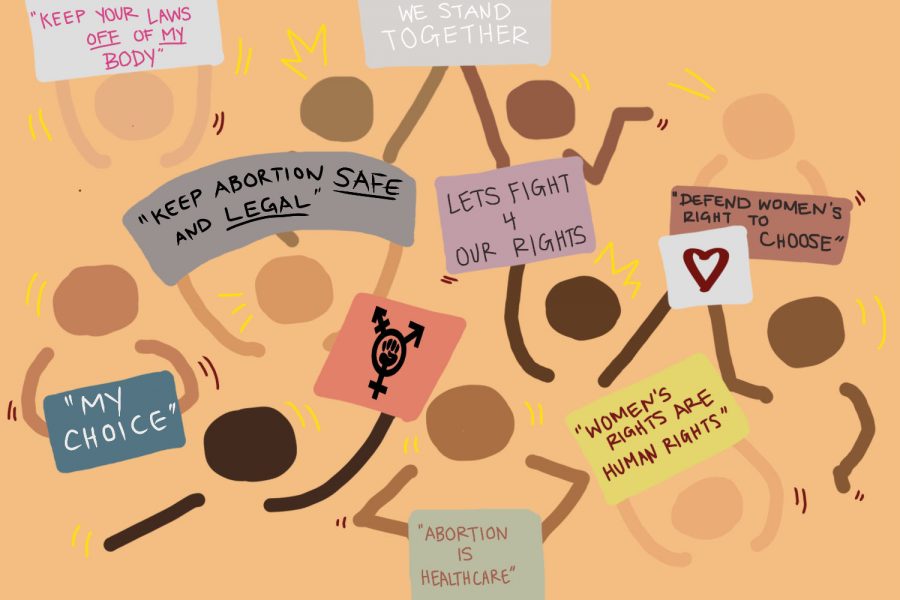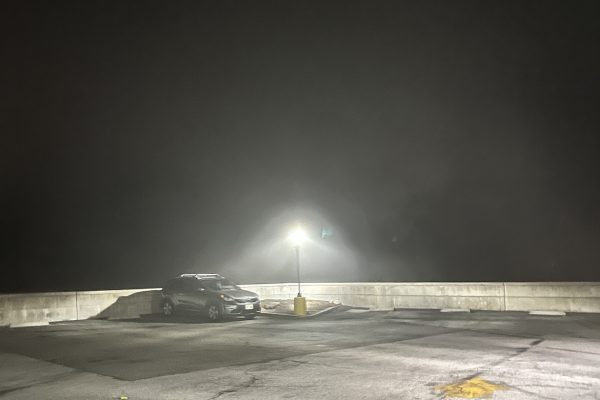Editorial: Alabama abortion law threatens women’s autonomy, lives
Photo credit: Leslie Castaneda
A photo illustration depicts slogans used by pro-choice protesters in response to an Alabama bill restricting access to legal abortions. The bill limits women’s autonomy and has the potential to endanger their lives if they turn to unsafe, illegal alternatives. Photo illustration by Leslie Castaneda.
On January 2, 1973, in the landmark case of Roe v. Wade, the Supreme Court ruled “restrictive state regulation abortion as unconstitutional,” according to Encyclopedia Britannica. This case marked a significant shift in American history, expanding women’s rights in America.
However, 46 years later, women’s rights are being threatened as states begin to do exactly what Roe v. Wade sought to eradicate.
On April 30, 25 members of the Alabama state senate voted to pass the nation’s most restrictive abortion law yet — and all of them were white men. Dubbed “The Human Life Protection Act,” the law would impose a near-total ban on abortions in the state of Alabama starting in November 2019 if enforced. The law includes an exception for cases where a woman’s health is at “serious” risk, but a proposal to add exceptions for cases of rape or incest was rejected. Women who have abortions would not be prosecuted, but doctors who perform the procedure could be charged with a felony and face up to 99 years in prison.
The consequences of this decision go far beyond the possible criminal punishment of doctors. This legislation takes away women’s autonomy over their own health. The slogan “get your policy off my body” sums it up: these men, who have never and will never experience pregnancy or abortion, have no right to make decisions about either. Although some women have moral objections to abortion, it is important that all have access to abortion should they need it.
A belief within the pro-life movement is that life begins at conception. Due to this belief, the “Human Life Protection Act” is seen as a lifesaving measure. However, in a world without access to legal abortions, women would simply turn to illegal — and far more dangerous — alternatives.
Before Roe v. Wade was passed, women found unsafe routes to abort their pregnancies, which could result in the women losing their own lives. In a 1976 article, researchers from the Center for Disease Control examined national abortion data from the three years surrounding the rulings and found that the number of illegal procedures in the country plummeted from 130,000 to 17,000 between 1972 and 1974. The article also states that the total number of abortion-induced deaths reduced by 50% over the same the two year period. By removing women’s right to safe abortion, legislators would contribute to a reversal of the progress that Roe v. Wade made. Given that the Alabama law would endanger women’s health, is it fair to call the law “The Human Life Protection Act”?
What can Archer students do? Although it is important to bring attention to the issue, a retweet or an Instagram post is not going to impact the decisions of lawmakers across the country.
Instead, try contacting your elected representatives, both state and federal, who are in support of policies that improve access to family planning, counseling and abortion care. Encourage your school to teach comprehensive sex education. Fundraise for clinics like Planned Parenthood to ensure that women will continue to have access to affordable health services.
It is crucial that we work now to ensure that abortion remains safe, legal and accessible for generations to come, because if not now, when? If not us, who?

The Oracle's student editorial board, led by the Editor-in-Chief, makes all decisions that pertain directly to the Oracle and has final say over all content....







![The Paris 2024 Olympic swimming pool is filled with bright lights and spectators. The Olympic games were held from July 26 to Aug. 11. While the event is meant to symbolize global unity, athletes from non-Western countries were met with accusations and scrutiny. [Paris 2024 Olympic Games] by [Roman Koksarov] is licensed under [CC BY 4.0.].](https://archeroracle.org/wp-content/uploads/2024/09/53891226234_11677c1e9f_o-1-600x415.jpg)



